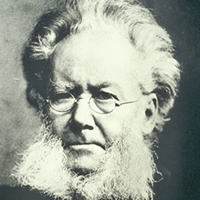Parallelism and Contrast in A Doll's House
Putting characters or situation in contrast, is a technique of plot design known as juxtaposition. For this, certain characters and situations are also made comparable or parallel by making them similar. In this way, comparable characters make the contrasts even more striking.

Henrik Ibsen (1828-1906)
In A Doll’s House, Nora is contrasted against Mrs. Linde, and Helmer is opposite to Krogstad. Rank is also somehow similar to Nora.
The most striking contrast is between Nora and Mrs. Linde. Nora is a happy wife in the beginning and turns out to be a tragic character at the end of the drama; Mrs. Linde is a tragic widow at first but she later becomes smugly satisfied wife of Krogstad at the end. Nora seems to be a plaything, a beautiful and interesting object of entertainment at first, but she turns out to be actually capable of thinking, seeking her identity and dignity, and she leaves her house at the end of the play. Mrs. Linde is a serious and independent woman, a grave lady living a listless life in the beginning, but she manages to find the role of a romantic young wife, happily dependent on her man. Nora is a symbol of revolution, poor Mrs. Linde, who will never understand so difficult ideas like 'dignity' is the stereotypical representative of the conservative woman. Nora stands for the future, Mrs. Linde stands for the past. The only one parallel between these two women is that Mrs. Linde also told lies to her lover, like Nora tells lies to her husband, to save the life of her mother and help her brothers. Nora looks very young and attractive, but Mrs. Linde looks middle-aged and pale. Nora has three children, some property and a possessive husband, but Mrs. Linde has none of them. And, if Nora walks out, leaving all that, Mrs. Linde walks in, eager to have them. Nora goes to fight the unknown, Mrs. Linde comes to get a security so that she can stop fighting for a living.
Torvald Helmer is contrasted with Krogstad. Though Helmer is a school friend of Krogstad, he is conservative and rigid, unsympathetic egoistic. Krogstad is supposed to be the villain of the play in and conventional terms, but he is sympathetic in feeling, progressive in thought, flexible in attitude and not rigid in his opinions. It is surprising that Krogstad collies to see whether Nora is too worried after his blackmailing. He comes and tells Nora that his intention is only to get his job back by blackmailing her husband, who has been so heartless that he has fired his schoolmate without genuine reason. He clearly tells Nora: "Mrs. Helmer, I've been thinking about you all day. Even duns and hack journalists have hearts, you know." He loves Nora, as a human being, and wants to tell her that he doesn't want to harm her. But, Helmer, who is supposed to love Nora, is heartless. No one can forgive such a hypocrite who scolds his loving wife so bitterly and gets ready to disown her when his prestige is slightly threatened. He is so conservative, narrow-minded, fake idealist, and corrupted that he decides to dismiss his friend from the job because he is addressed by his, first name; even worse, he makes a pretension that Krogstad is immoral and corrupt, when he actually tells the actual reason to his wife. If Helmer decides to disown his loving wife because of ego, Krogstad decides to marry a widow because of love. Helmer is disgustingly inhuman; Krogstad melts our heart with his humanity.
There are minor parallels and contrasts other than the above, like the contrast between Dr. Rank and Helmer, and the slight parallel between Nora and Krogstad. Dr. Rank contrasts with Helmer in that he is homeless and unhappy, whereas Helmer has a home and family and is the master of it. Dr. Rank is sick, Helmer is healthy. Dr. Rank is frank and even revolutionary in his sexual attitudes, whereas Helmer is a terribly conservative killjoy. Helmer is sensitive about self-respect and social status, whereas Dr. Rank takes life like a joke. Another minor contrast is between Nora and Dr. Rank. If Dr. Rank is a symbol of death and decay, Nora is a symbol of life and exuberance, change and revolution. But there is also a slight comparison between them in the sense that both Nora and Dr. Rank have inherited something from their parents: Nora has got her lavish nature from her father, and Rank has inherited his tuberculosis which is said to be the result of his father's recklessness.
Finally, there is some similarity between Nora and Nils Krogstad in the sense that both of them have committed forgery for the sake of their family. In fact, both Nora and Krogstad are liberal thinkers and are also progressive. They both have a human heart.
A Doll's House Study Center
Signification of the Slamming of the Door in A Doll's House
Nora's Identity as a Person in A Doll's House
The Plot Construction in A Doll's House
